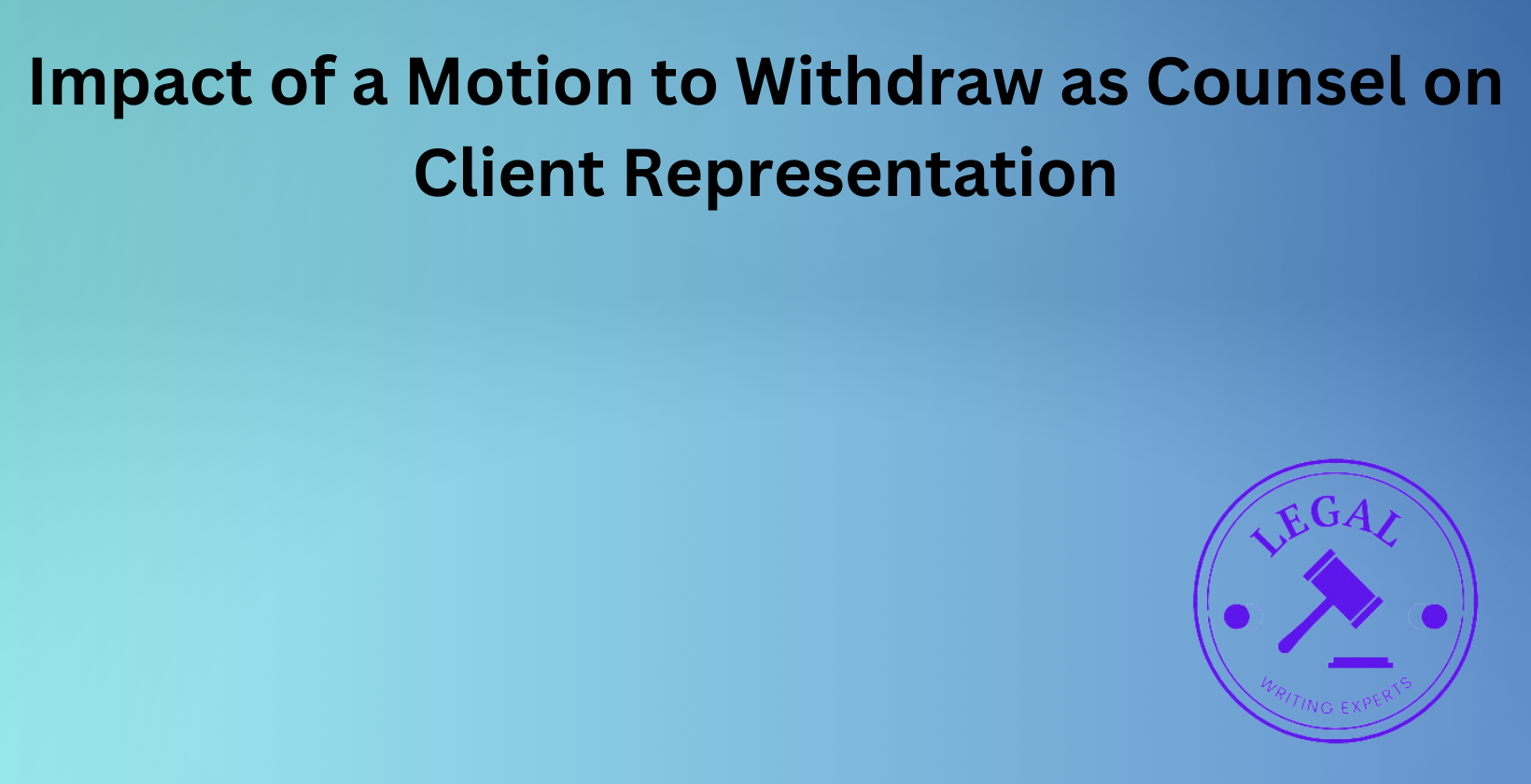Impact of a Motion to Withdraw as Counsel on Client Representation
Written by
Jessica E
February 19, 2025 · 8 min read

A motion to withdraw as counsel can significantly impact a client’s legal representation. The withdrawal process can arise due to ethical conflicts, client misconduct, or personal reasons affecting the attorney-client relationship. Understanding the legal grounds for withdrawal, the procedural steps, and the implications for ongoing cases is essential for both attorneys and clients. When an attorney seeks to withdraw, the client may experience delays, difficulties in securing new legal representation, and potential legal disadvantages. Courts generally evaluate withdrawal requests based on ethical considerations, client rights, and the impact on the administration of justice. Clients should be aware of their options and obligations if their attorney files a motion to withdraw, as well as the steps to secure new legal representation if necessary.
What Is a Motion to Withdraw as Counsel?
A motion to withdraw as counsel is a formal request submitted by an attorney to a court seeking permission to terminate their legal representation of a client. The motion must typically outline the reasons for withdrawal and confirm that the attorney has met all legal and ethical obligations toward the client. Courts evaluate these motions based on whether the withdrawal will cause undue harm to the client or disrupt ongoing legal proceedings.
When Is an Attorney Required to Withdraw from Representation?
An attorney is required to withdraw from representation when continuing to represent the client would result in a violation of ethical or legal rules. Situations requiring mandatory withdrawal include conflicts of interest, the attorney’s inability to competently represent the client, or when the client demands illegal or unethical actions. The American Bar Association’s Model Rules of Professional Conduct mandate withdrawal in cases where representation would violate legal ethics.
Under What Circumstances Can an Attorney Voluntarily Withdraw from a Case?
An attorney can voluntarily withdraw from a case if doing so does not cause material harm to the client. Acceptable reasons for voluntary withdrawal include nonpayment of legal fees, a breakdown in communication, or a fundamental disagreement over legal strategy. Courts typically assess voluntary withdrawal requests to ensure that the client is not unfairly disadvantaged.
What Is the Procedure for Filing a Motion to Withdraw as Counsel?
The procedure for filing a motion to withdraw as counsel requires the attorney to submit a written motion to the court stating the reasons for withdrawal. The attorney must provide notice to the client and, in some jurisdictions, obtain the client’s acknowledgment. If the court grants the motion, the attorney must ensure that all case materials are transferred appropriately to the client or new counsel. Some courts require a hearing before approving withdrawal.
How Does a Motion to Withdraw Affect Ongoing Client Representation?
A motion to withdraw affects ongoing client representation by potentially delaying proceedings, increasing legal costs, and requiring the client to secure new legal representation. If granted, withdrawal can leave the client without legal counsel at a critical stage in litigation. Courts may deny withdrawal requests if it would severely prejudice the client or interfere with court schedules.
What Are the Ethical Considerations for Attorneys Seeking to Withdraw?
Attorneys seeking to withdraw must adhere to ethical guidelines to protect the client’s interests. Ethical considerations include providing reasonable notice, ensuring that withdrawal does not harm the client’s legal standing, and maintaining confidentiality. The Model Rules of Professional Conduct require attorneys to take reasonable steps to mitigate adverse effects on the client before withdrawing.
How Can Clients Respond If Their Attorney Files a Motion to Withdraw?
Clients can respond to a motion to withdraw by contesting the motion in court if they believe the withdrawal would negatively impact their case. They may present arguments that the attorney’s withdrawal would cause undue hardship or delay. Clients may also use this opportunity to negotiate continued representation or seek new counsel.
What Are the Potential Consequences for Clients When Their Attorney Withdraws?
The potential consequences for clients when their attorney withdraws include delays in legal proceedings, additional legal costs, and difficulties in securing new representation. In cases involving imminent deadlines or trial dates, a withdrawal can place the client at a significant disadvantage. Courts may provide limited extensions to allow the client to find new legal representation.
How Can Clients Find a New Attorney After a Withdrawal?
Clients can find a new attorney after a withdrawal by seeking referrals from bar associations, legal aid organizations, or online legal directories. Many clients use legal document drafting services and legal document review online to bridge the gap while searching for a new attorney. Clients should act quickly to avoid delays in their legal matters.
What Happens If a Court Denies an Attorney’s Motion to Withdraw?
If a court denies an attorney’s motion to withdraw, the attorney must continue representing the client until the court permits withdrawal or the case concludes. Courts deny withdrawal requests when they determine that the client would suffer significant harm or that withdrawal would disrupt court proceedings. Attorneys in this situation must fulfill their legal and ethical obligations despite the court’s ruling.
How Do Withdrawal Rules Differ Between Jurisdictions?
Withdrawal rules differ between jurisdictions based on state bar regulations and court procedures. Some jurisdictions impose stricter requirements, such as mandatory client consent or judicial approval, before allowing withdrawal. Legal research service providers and legal research companies offer jurisdiction-specific guidance to attorneys navigating withdrawal procedures.
What Are the Attorney’s Obligations to the Client After Withdrawal?
An attorney’s obligations to the client after withdrawal include transferring case files, refunding any unused retainer fees, and providing information to facilitate the transition to new legal representation. Attorneys must comply with legal document review services near me to ensure that the client’s rights and interests remain protected. Ethical rules require attorneys to take reasonable steps to minimize any negative impact on the client’s case.


